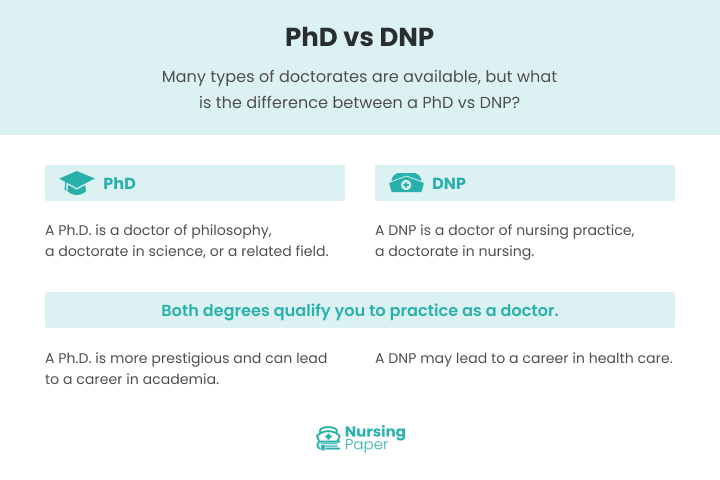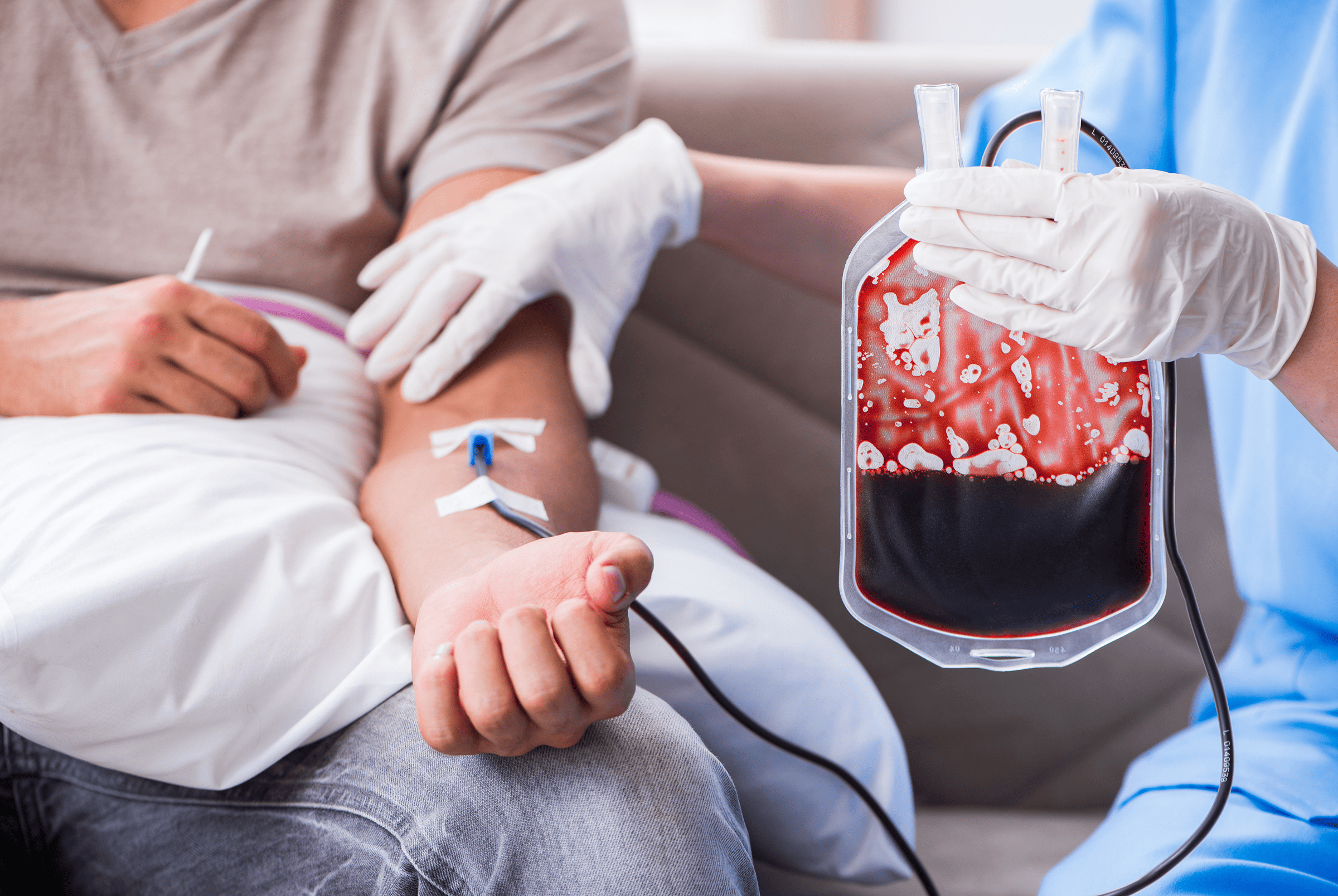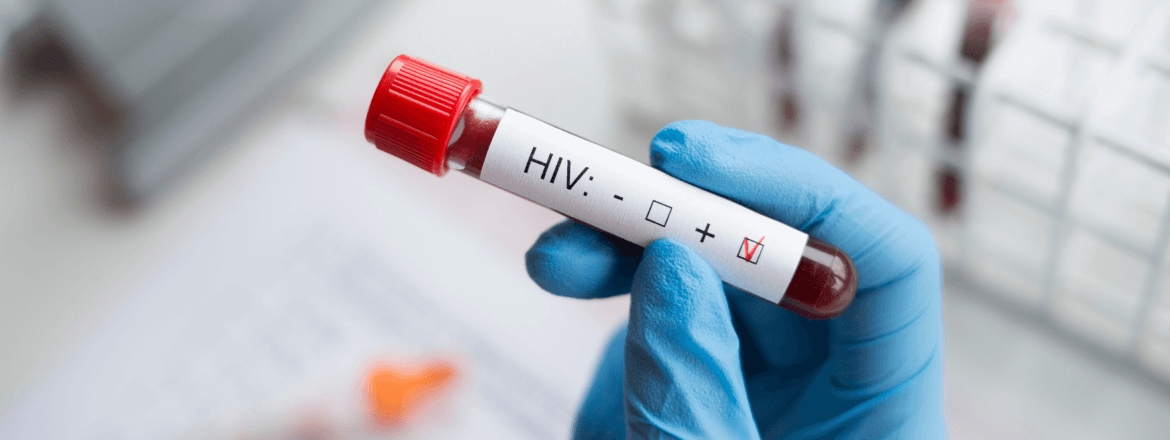
What Is the Difference Between DNP and PhD in Nursing – Fundamentals
After graduation, nursing students who gained their master’s degree should decide what direction to move in their studies – to choose a DNP or PhD in nursing. Both of them are necessary to get an advanced qualification in nursing practice, but they use different practices. If you applied to a nursing department at a medical college, you should define whom you want to become – a nursing researcher who’s working on scientific investigations or a clinical nurse practitioner dealing with patients and improving healthcare industry outcomes. So, let’s quickly answer the following questions: “What is a DNP in nursing?” “What is the difference between a DNP and a PhD in nursing?” and “What are the major features of each degree?”
Look through the given DNP-PhD comparison attentively to determine each program’s characteristics and decide what is closer to your preferences. DNP (doctor of nursing practice) is a clinical practice qualification, while a PhD (doctor of philosophy in nursing) focuses on research execution. In short, a DNP degree allows working at clinical institutions and interacting with patients. A PhD degree is suitable if a student plans to become a scientist, nurse researcher, or educator.
Traditionally, studying a PhD is longer than DNP – as usual, it takes at least 5 to 7 years to complete. In comparison, you can gain a DNP degree and become a nurse practitioner just in 2-3 years. A DNP degree focuses on nursing practice aiming to prepare qualified nurses in healthcare by translating theoretical and research background into practical skills. While studying at DNP, students learn to apply EBP methods, deal with health care improvement via data analysis. Also, they learn to develop strong leadership and executive qualities to provide prime patients’ care as a result.
On the contrary, a PhD degree is a research doctorate that prepares nursing scientists who will conduct valuable scientific researches and facilitate area development. The studying course concentrates more on defining chronic illnesses and the directions of the healthcare system. It is mostly a theoretical science that includes studying such disciplines as a philosophy of science, implementing diverse research methods, analysis of data, etc.
Weigh the pros and cons of the discussed degrees and decide whether PhD nursing vs DNP will meet your expectations from studying there and bring you the necessary knowledge and qualities to upgrade your performance rate in nursing.

Difference Between DNP and PhD Degree Prerequisites
A vital part of the difference between DNP and PhD in nursing is the set of academic prerequisites you need to enroll in each of these educational programs. For instance, to join a PhD program in nursing, you will have to showcase the following credentials:
- A BSN degree from an accredited institution.
- A certificate of successfully passed NCLEX-RN examination (mandatory for nurses working in the USA).
- A Master of Science in Nursing (MSN) degree.
Thus, the major difference between DNP and PhD is that for a DNP degree, you have to have all the PhD credentials and additionally receive an RN license and provide proof of minimum one years of work experience. A DNP degree is more demanding in terms of prerequisites.
Difference between Doctorate and PhD: Setting Your Academic Goals
We’ve already outlined the major difference between DNP and PhD degrees in their notion and destination, and now let’s highlight the answer to “What is the difference between DNP and PhD in nursing?” in their key characteristics and what advantages they bring to nursing students. Graduates from the DNP program are already eligible nurses who can apply their evidence-based background in nursing practice and bring it to hospitals to improve the healthcare system workflow and prove nurses’ leadership skills and their significant role in medical settings.
After completing a course, a DNP student can perform and interpret diagnosis in detail, treat various mild and acute illnesses, examine patients’ medical history, and assess their health state. Also, nurse practitioners can educate patients and their families about a particular disease, ways to prevent it next time and mitigate its effect. Moreover, these specialists will perform the needed examinations and estimate a patient’s condition, detect some severe changing and choose a fitting treatment plan.
Speaking of PhD, this degree is predominantly used for getting a research-based education that means to execute researches and teach students. If a nursing student got a PhD, they have two options to move further – to become a nurse educator or researcher. What are the major responsibilities of this specialist?
- Conducting scientific researches by defining design and issues.
- Joining meetings and conferences to present your publications.
- Gathering the needed data and writing reports on findings.
- Working on various scientific projects and getting funding.
- Mentoring students concerning their projects.
- Preparing educational material for undergraduates.
- Delivering lectures to graduate nursing students.
Thus, what do you suppose about DNP vs PhD in nursing after discovering such details about the major activities of these two advanced degrees? Make the right choice to be occupied in interesting projects, nursing services improvement, or be a part of a scientific community.
PhD vs DNP Salary Comparison
Let’s find the differences between PhD vs DNP salary. The latter usually earn more because they work in clinical settings and leadership roles. PhD holders often work in research or teaching, which may not pay as much but offer DNP benefits like a better work schedule.
| Degree | Average Salary | What Affects Pay? |
| PhD in Nursing | Usually lower than DNP | Research and teaching roles may not pay as much as clinical practice in nursing |
| Doctor of Nursing Practice | Usually higher than other levels | Advanced clinical positions often provide nursing workers with more money |
Pros and Cons of DNP Degree
Let’s consider the pros and cons of DNP degree to get a deeper glimpse into the matter.
Pros:
- Getting in-depth knowledge to promote the nursing practice and patients’ service.
- Improving high competence for preserving clinical setting workflow.
- Making nursing and healthcare areas more advanced.
- Strengthening personal leadership qualities.
- Generating innovative & effective decisions.
Cons:
- Takes years of study, which can be challenging for working nurses.
- Tuition costs can be high
Benefits of Obtaining PhD vs DNP in Nursing
If you’re a nurse looking to move up in your career, check out the nursing PhD vs DNP benefits. The former comes first.
- A better work schedule. In academia, the schedule is usually more predictable – more of a 9-to-5 setup with national holidays off instead of working for 12 hours as a nurse.
- A chance to shape healthcare. You can dive into research that influences healthcare policies and nursing practices. Your work could make a real difference in the field.
- Leadership and admin roles. It is possible to get leadership positions in research and education. You can also become a mentor and guide new nurses as they start their careers.
Earning a Doctor of Nursing Practice earns several points in the PhD vs DNP rivalry as well:
- Higher salary. Nurses usually earn more than those with other levels. Their advanced skills and leadership roles can also boost their earning potential.
- More career prospects. This opens doors to leadership positions that other levels might not qualify for. You can help make a bigger impact.
- Expert-level knowledge. Since a DNP is the highest degree in nursing, it helps you get the highest level of expertise in this area.
Career Prospects of DNP vs PhD Holders
There’re various options for employment after getting a DNP: a nursing graduate can choose to become a family, pediatric, or neonatal nurse practitioner, or a registered nurse anesthetist, and many other practice-based specialties. In the end, a student will have good command in:
- Dealing with children’s health state.
- Providing primary & acute care in medical settings.
- Promoting the healthcare delivery system.
- Conducting comprehensive women’s health diagnostics.
- Participating in surgical interventions to provide anesthesia.
After finishing PhD program, graduates will get an opportunity to open up the following positions:
- Nursing educator.
- Clinical nurse researcher.
- Public health policy specialist.
- Nursing scientist-supervisor.
These specialties enable students to come up with projects execution, clinical investigations to improve nursing care via applying EBP discoveries. They also can arrange educational curriculum for students and supervise them during projects composition.
Keep in mind that after graduating from DNP, you need to compose a capstone project. That means you should search for and analyze lots of literature, apply existing background in the medical field to conduct a worthy examination of the chosen topic. In contrast, to get a PhD degree, a student must write a dissertation based on profound, unique research. It also involves personal findings implementation and creating a new database within the selected subject.
To conclude, think well about where to apply to – a DNP or PhD in nursing – and weigh all advantages and privileges without hurry to determine what you want to specialize in and deal with every day.















































